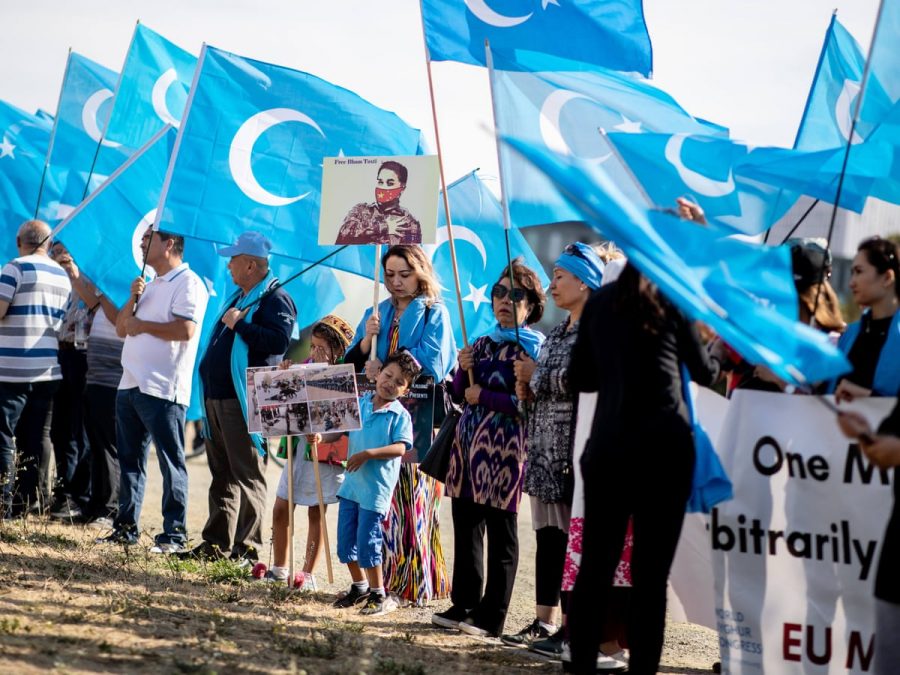The Critical Case of China’s Camps
A group of marchers, advocating for the release of the detained Uighurs.
Hidden as a secret from the public by the Chinese government, the Uighur camps in China are a recently uncovered and ongoing issue. These camps have detained the Uighurs, who are a small Turkic group of people living in the northwestern region of Xinjiang and magically identify as Muslims. China first claimed the Uighur camps were helping the minority group to develop the necessary education to have better lives, specifying that it was a voluntary choice. However, evidence has shown that these camps are forcing the Uighurs’ stay, have attacked their rights to freedom, and have gone to extreme measures of physical torture.
There are several reasons why this control over Xinjiang is taking place. According to The Guardian, Xinjiang is a region containing important resources such as oil and coal. A Uighur dominated location, China wishes to ensure its control over the area and people. Along with this, were past instances of tensions in Xinjiang involving the fight for control over the area. According to GlobalSecurity, during the 1990 Baren Township Riot, “…as many as 1600 people (Uighurs and Chinese police) were killed.” Because of these events, China is threatened by separatists and have therefore used these camps to reeducate the Uighurs under strict control. Although a minority, the 3 million people detained in the camps reflect the reality of how many Uighurs are being forced to stay in the camps against their will. According to the Campaign for Uyghurs organization (CFU), an member states, “In the beginning, the Chinese government outright denied the existence of these camps but following global pressures and mounting evidence, they changed the narrative and began to euphemistically refer to the concentration camps as ‘vocational training centers’.” The goal of the camps, referred to as “training and education”, is the government’s method of assimilating the Uighurs into their way of life and culture. They are forced to let go of their religious faiths and practices, as well as accept the government’s version of Xinjiang’s history, which pushes for China’s complete control.
As a result, the Uighurs are separated from their homes, friends, and families, and disappear from many occasions without any notice. The CFU addresses their worries claiming, “This agony of not knowing about how your missing relative is doing, whether they’re safe, sick, or even alive is something that haunts Uyghurs in diaspora every single day.” These acts of abduction are often committed against regular Uighur citizens. In another case, Louisa Greve, a director of global advocacy for Uyghur Human Rights Project refers to an instance where it became evident that the camps were not voluntary or humane: “Regarding the camps, you can [Fatimah Abdulghafur’s story] for a description of how the camps were uncovered by the outside world.” Abdulghafur’s story explains how her father’s death was revealed after years with evidence that the cause and place of death were in an internment camp. Being unable to know a close one’s whereabouts or situation shows that the camps are disconnected from society. Other instances and evidence describes the treatments that the Uighurs face, including a video from BBC News leaked from inside the camps showing a detainee being chained up and kept in a tight space. There have not only been attacks on the Uighurs inside the camps but also outside, as thousands of mosques and religious sites have been destroyed and Uighurs are put into the labor force to create garments. As more evidence of not just the camps’ true purpose but what goes inside and outside of them is revealed, it becomes more urgent to share and bring awareness to the issue. The Save Uighur Organization as well as the End Uyghur Forced Labor organization are two groups that encourage calls to action. The End Uyghur Forced Labor coalition calls for help: “We call on governments, MSIs, brands, and other stakeholders to join us in challenging this abusive system.”
There are many ways to share this situation with others. Greve recommends that we should help the people who have experienced this pain by donating if possible: “One fantastic thing would be to set a goal of mobilizing people to [send money to GoFundMes].” Greve mentions the case of Tursunay Ziyawudun, who faced psychological and physical torture in the camps. Although she was released, her encounters with malnutrition and having drugs forcibly injected into her have left unerasable trauma. Emailing businesses not to use Uighur labor, writing to Congress, are just a few ways to tackle this problem and make it come to the world’s attention. The CFU also preaches the importance of using words for positive, necessary change: “Be vocal, post on your social media and teach your friends, family, and colleagues about what is happening.” Taking action serves as the first step towards bringing awareness to such issues around the violations of freedom.






